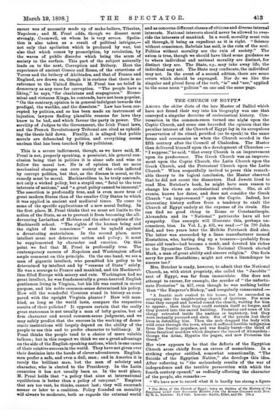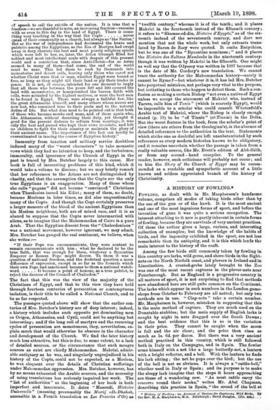THE CHURCH OF EGYPT.*
AMONG the obiter dicta of the late Master of Balliol which have not found their way into his biography was one that
conveyed a singular doctrine of ecclesiastical history. Con- versation in the common-room turned one night upon the
Coptic Church, and some one hazarded the opinion that the peculiar interest of the Church of Egypt lay in its scrupulous preservation of its ritual, petrified (so to speak) in the same
forms and ceremonies as when the Church seceded in the fifth century after the Council of Chalcedon. The Master then delivered himself upon the development of Churches :— " I suppose," he said, "that every Church is an improvement upon its predecessor. The Greek Church was an improve- ment upon the Coptic Church, the Latin Church upon the Greek Church, and the Protestant Church upon the Latin Church." When respectfully invited to press this remark- able theory to its logical conclusion, the Master observed that he did not count the dissenters. Had Jowett lived to read Mrs. Butcher's book, he might have seen reason to change his views on ecclesiastical evolution. She, at all events, knows her dates, and does not consider the Greek Church "an improvement" upon the Coptic. Indeed, her
interesting history suffers from a tendency to exalt the Church of Egypt unduly at the expense of its rivals. She
can find no good thing in Rome or Constantinople. Alexandria and its "National" patriarchs have all her
sympathy. One example will illustrate this, perhaps un- conscious, bias. In Vol. I., p. 431, we read :—" In 799 John died, and two years later the Melkite Patriarch died also. The latter was succeeded by a linen manufacturer named Eustathius, who, having dug up a treasure—probably from some old tomb—had become a monk, and devoted his riches
to the Byzantine Church. The National Church elected Mark, a man of great ability and sincere religion." One feels sorry for poor Eustathius ; might not even a linendraper be sincere too ?
Mrs. Butcher is ready, however, to admit that the National Church, as, with strict propriety, she called the " Jacobite " sect of Egypt, was far from immaculate. She does not attempt to excuse, for example, the murder of "the unfortu- nate Proterius" in 457, even though he was nothing better than "the Emperor's Bishop," and irregularly consecrated :—
"A frantic mob rushed to his house, but he succeeded in escaping into the neighbouring church of Quirinua. For some time they surged and howled round the church, waiting for him to appear ; then their fury could restrain itself no longer, and they poured into the sacred building. Proterius and some of his clergy retreated inside the narthex or baptistery, but they were instantly pursued and slain. Six of the priests lost their lives in defending him. Then the mob dragged the body with wild cries through the town, where it suffered terrible indignities from the frantic ,populace, and was finally burnt—the third of those fanatical murders which disgrace the record of Alexandria : George the Arian, Hypatia the pagan, and now Proterius the Greek."
Her view appears to be that the defects of the Egyptian
Church arose chiefly from an excess of monachism. In a striking chapter entitled, somewhat sensationally, "The
Suicide of the Egyptian Nation," she develops this idea. After referring to "the melancholy results of the war of independence and the terrible persecution with which the fourth century opened," as radically affecting the character of the people, she remarks :—
"We have now to record what it is hardly too strong a figure
• The Story of the Church of Rgypt being an Outline of tha History of the Rgyptsana under their Successive Masters from tha Roman Conquest until No to. By B. L. Butcher. In 2 vol.,. Lonuon: Smith, Elder, and Co. Real
of speech to call the suicide of the nation. It is true that a fraction—we are thankful to note, an increasing fraction—remains with us even to this day in the land of Egypt. There is some- thing very touching in the way that the Copts never speak of their community as a church, but always as 'the Nation.' But as the war of independence had decimated the brave and patriotic among the Egyptians, as the Era of Martyrs had swept away in fiery chariots the best and most purely religious spirits which were left to her, so, later, the Arian triumph filled her noblest and most intellectual souls with despair of this present world and a conviction that, since Anti-Christ—for so Arius seemed to many of them—had come, the end of the world must be near. This led them to rush by thousands into monasteries and desert cells, leaving only those who cared not whether Christ were God or man, whether Egypt were bound or free, so long as they might till their land or ply their trades in peace. It is not, of course, intended for one moment to imply that all those who between the years 320 and 390 covered the land with monasteries, or honeycombed the barren fields with cells, were actuated by the highest motives, or were the best men to be found in Egypt. There were always a faithful few, like the great Athanasius himself, and many others whose names are now lost, who remained true to their posts and to the natural duties of life. But what does need to be pointed out is that both of those who became monks and nuns, and of those again who, like Athanasins, without deserting their duty, yet thought it good for the present distress to refrain from marriage, it was only the best and purest who kept their vows inviolate, and left no children to fight for their country or maintain the glory of their ancient name. The importance of this fact can hardly be overestimated in tracing the course of Egyptian history."
Immunity from taxation and military service doubtless induced many of the "worst characters" to take monastic vows which they had no intention to keep, and the turbulence, immorality, and ignorance of the Church of Egypt in the past is traced by Mrs. Butcher largely to this cause. Her book is full of interesting problems of this kind, which it would take a volume to discuss ; but we may briefly remark that her references to the Arians are not distinguished by charity, and that the assumption that the Copts are the only true Egyptians is an exaggeration. Many of those whom she calls " pagans " did not become " convinced " Christians when Theodosius issued his Edict ; many of them, no doubt, became Moslems in later times, as did also unquestionably many of the Copts. And though the Copt certainly preserves a larger measure of the blood of the ancient Egyptians than his Moslem neighbour, both are of mixed race, and it is as absurd to suppose that the Copts never intermarried with aliens, as to imagine that the Mahommedan of Cairo is a pure Arab. That the Egyptian dissent from the" Chalcedonians " was a national movement, however ignorant, we may admit. Mrs. Butcher has gauged the real sentiment, we believe, when she writes
"If their Pope was excommunicate, they were content to remain excommunicate with him ; what he declared to be the true faith, that was enough for them, whatever a Byzantine Emperor or Roman Pope might decree. To them it was a question of national freedom, and the doctrinal question a mere difference of expression, except in so far as the formula which their own Pope had sanctioned became to them a national watch- word It became a point of honour, as a true patriot, to reject the decrees of the Council of Chalcedon."
The fact that this was the view of the majority of the Christians of Egypt, and that to this view they have held through fourteen centuries of persecution or contemptuous isolation, is their title to be called a National Church, and to be so far respected.
The passages quoted above will show that the earlier cen- turies of Mrs. Butcher's history are of deep interest; indeed, a history which includes such opposite yet dominating men as Origen, Athanasins, and Cyril, could not be anything but interesting ; and if the long roll of martyrs and the recurring cycles of persecution are monotonous, they, nevertheless, ex- plain much that would otherwise be obscure in the character and development of the Church. We find the later history much lees attractive, but this is due, to some extent, to a lack of detailed sources, or the circumstance that such meagre sources as exist are chiefly Mahommedan. Makrizi, admir- able antiquary as he was, and singularly unprejudiced in his history of the Copts, could not be expected, as a Moslem, to wax eloquent over the details of Christian sufferings under Mahommedan oppression. Mrs. Butcher, however, has by no means exhausted the Arabic sources, and the necessity of using translations has seriously impaired her work. The "list of authorities" at the beginning of her book is both imperfect and inaccurate. It dates " Masoudi, Histoire Universelle" (meaning presumably the lifuraj edh-Dhahab,
accessible IA a French translation as Les Prairies d'Or) as
"twelfth century," whereas it is of the tenth; and it places Makrizi in the fourteenth instead of the fifteenth century ; it refers to " Shaniee-ed-din, Histoire d'Egypte," as of the six- teenth instead of the seventeenth century, and doe3 not mention that not the whole work, but only extracts trans- lated by Baron de Sacy were quoted. It omits Eutychius, but he was one of the "Byzantine nominees ; " and it places the Histoire des Sultans Mamlouks in the nineteenth century, though it was written by Makrizi in the fifteenth. One might as well say that the Odyssey was written in 1897 because that is the date of Mr. Cordery's new translation. We cannot trace the authority for the Mahommedan history—surely it cannot be Ryme ?—but whatever it is, it has led Mrs. Butcher into perpetual mistakes, not perhaps very vital to the purpose, but irritating to those who happen to detect them. Such a con- fusion as making a certain Bishop "not even a native of Egypt unless we accept the statement of Makrizi who, instead of Tarsus, calls him of Tanis" (which is scarcely Egypt), would be impossible to a scholar who could consult Wiistenfeld's Arabic text of Makrizi, where the Bishop is clearly enough stated (p. 18) to be "of Tinnis " (et-Tinnisi) in the Delta. But the worst feature in the book, from the scholar's point of view (there are others from the theologian's), is the absence of detailed references to the authorities in the text. Statements which strike one as doubtful are left unsubstantiated by such references as every modern historian knows to be obligatory, and it remains uncertain whether the passage is taken from a really valuable source, like Mr. Evett's edition of Alytt-SA.lih, or from any second - hand compiler. To the general reader, however, such criticisms will probably not occur; and to him the Story of the Church of Egypt may be recom- mended as a readable and sympathetic account of a little known and seldom appreciated branch of the history of Christianity.







































 Previous page
Previous page